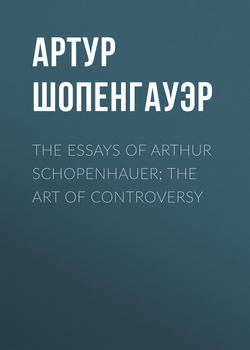The Essays of Arthur Schopenhauer; the Art of Controversy

Реклама. ООО «ЛитРес», ИНН: 7719571260.
Оглавление
Артур Шопенгауэр. The Essays of Arthur Schopenhauer; the Art of Controversy
THE ART OF CONTROVERSY
PRELIMINARY: LOGIC AND DIALECTIC
THE BASIS OF ALL DIALECTIC
STRATAGEMS
I
II
III
IV
V
VI
VII
VIII
IX
X
XL
XII
XIII
XIV
XV
XVI
XVII
XVIII
XIX
XX
XXI
XXII
XXIII
XXIV
XXV
XXVI
XXVII
XXVIII
XXIX.15
XXX
XXXI
XXXII
XXXIII
XXXIV
XXXV
XXXVI
XXXVII
XXXVIII
ON THE COMPARATIVE PLACE OF INTEREST AND BEAUTY IN WORKS OF ART
PSYCHOLOGICAL OBSERVATIONS
ON THE WISDOM OF LIFE: APHORISMS
GENIUS AND VIRTUE
Отрывок из книги
By the ancients, Logic and Dialectic were used as synonymous terms; although [Greek: logizesthai], "to think over, to consider, to calculate," and [Greek: dialegesthai], "to converse," are two very different things.
The name Dialectic was, as we are informed by Diogenes Laertius, first used by Plato; and in the Phaedrus, Sophist, Republic, bk. vii., and elsewhere, we find that by Dialectic he means the regular employment of the reason, and skill in the practice of it. Aristotle also uses the word in this sense; but, according to Laurentius Valla, he was the first to use Logic too in a similar way.1 Dialectic, therefore, seems to be an older word than Logic. Cicero and Quintilian use the words in the same general signification.2
.....
It may be noted here that synonyms are two words for the same conception; homonyms, two conceptions which are covered by the same word. (See Aristotle, Topica, bk. i., c. 13.) "Deep," "cutting," "high," used at one moment of bodies at another of tones, are homonyms; "honourable" and "honest" are synonyms.
This is a trick which may be regarded as identical with the sophism ex homonymia; although, if the sophism is obvious, it will deceive no one.
.....